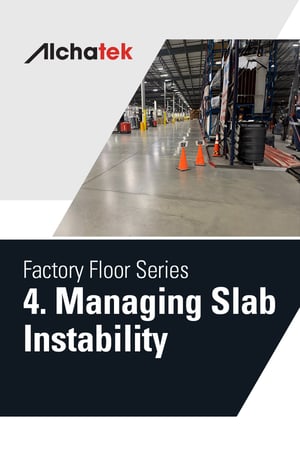
 Plant and factory managers must select qualified contractors in order to effectively address the challenges associated with slab instability. Choosing contractors with expertise in slab stabilization and polyurethane application will enable managers to tackle these issues successfully.
Plant and factory managers must select qualified contractors in order to effectively address the challenges associated with slab instability. Choosing contractors with expertise in slab stabilization and polyurethane application will enable managers to tackle these issues successfully.
Load Distribution and Utility Infrastructure
Before discussing contractor selection, it's essential to understand the broader implications of unstable or sunken slabs, such as their impact on load distribution and utility infrastructure.
Impact on Structural Integrity
Improper load distribution due to uneven or unstable slabs can compromise the structural integrity of the facility, leading to more significant issues over time.
Utility Disruptions
Sunken slabs can also adversely affect embedded utility lines, such as electrical conduits and plumbing, leading to service outages and potentially costly repairs.
Quality Control and Scalability
Stable slabs are crucial for maintaining product quality and operational scalability.
Precision in Manufacturing
Floor irregularities can compromise manufacturing precision, leading to product defects and affecting quality control metrics.
Operational Flexibility
Unstable slabs can hinder the ability to scale operations or reorganize the production layout, impacting long-term growth prospects.
Selecting a Qualified Geotechnical Contractor
Choosing the right contractor is a critical step in effectively managing slab instability. Here are some key considerations:
Expertise in Polyurethane Solutions
Look for contractors who specialize in using polyurethane for soil stabilization and concrete leveling. Their expertise will ensure that the job is done effectively and durably.
Specialized Training
Ensure that the contractor holds relevant qualifications, such as factory training from the material manufacturer.
Past Projects and References
Ask for case studies or references from relevant past projects. This will give you an idea of the contractor's capability and reliability.
Safety Record
Review the contractor's safety record, especially in the context of industrial settings. A strong safety record indicates a high level of professionalism and adherence to best practices.
Environmental Compliance
If your plant has specific sustainability goals or needs to comply with environmental regulations, make sure the contractor is experienced in using environmentally friendly polyurethane products.
Key Questions to Ask Potential Contractors
What is your experience with industrial projects similar to ours?
- Can you provide references or case studies?
- What types of polyurethane materials do you recommend, and why?
- How do you approach safety and environmental compliance?
- What is your proposed timeline and cost estimate for the project?
Experienced Polyurethane Applicators
Entrusting this work to a qualified contractor offers several advantages:
Cost-Effectiveness
A specialized contractor can complete the job efficiently, reducing downtime and long-term maintenance costs.
Durability
Contractors experienced in polyurethane applications can offer a durable, long-lasting solution to slab instability.
NSF-Approved Products
For plants requiring compliance with specific health and safety standards, contractors can use NSF-approved polyurethane products.
The Key to Successful Slab Repair
Selecting a qualified geotechnical contractor is a pivotal step in effectively managing the challenges associated with slab instability in industrial settings. By focusing on contractor expertise, training, and experience, plant and factory managers can make an informed decision that addresses their specific needs. The key to successful slab repair lies in choosing a contractor who can offer a comprehensive approach, from initial assessment to final quality checks. By taking this route, managers can ensure the integrity of their industrial floors, thereby mitigating risks and enhancing operational efficiency.


